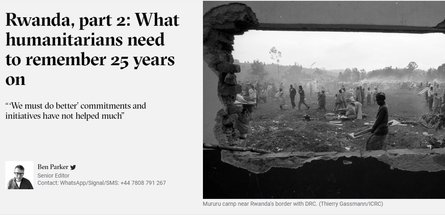
The 1994 Rwandan genocide led to soul-searching among the diplomatic, human rights, and humanitarian communities. The aid response was found to be poorly coordinated, politically adrift, and focused on the wrong things. Twenty-five years on, what lessons did humanitarians learn, and can remembering them help deal with today’s emergencies?
“The post-Rwanda ‘we must do better’ commitments and initiatives have not helped much, for example, in crises such as Myanmar, Syria, Yemen, Afghanistan, South Sudan,” said Norah Niland, a former UN humanitarian official who worked on Rwanda at the time. “It’s distressing.”
On 6 April, 1994, extremists in the Rwandan government unleashed a pre-planned campaign that left up to a million dead in 100 days. Army, militia, and civilians targeted the country’s ethnic Tutsi minority, moderates from the Hutu majority, and smaller groups. They were stopped only by a rebel takeover.